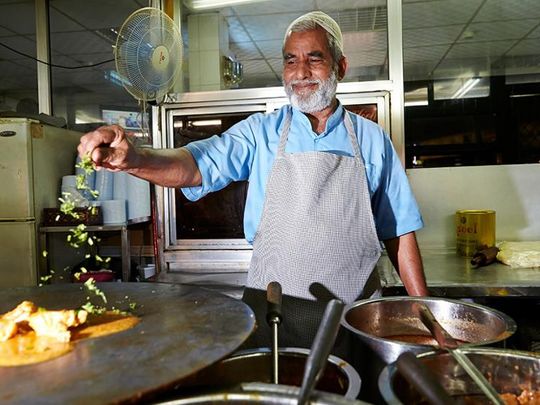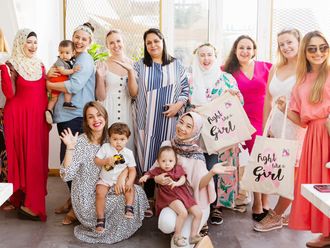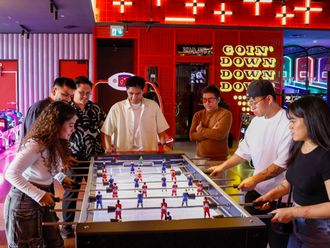
Twelve years ago, on a hot summer evening, a friendly cabbie dropped me at Ravi restaurant in Satwa. I was new in the city, tired of takeaways, and longed for some comfort food. ‘Go on,’ he said, ‘try the chicken tikka. You’ll thank me for bringing you here.’ I was a tad apprehensive, eyeing the simple but practical tables that lined the pavement with suspicion and wondering whether the food would be palatable. I didn’t have to. The food was delicious.
Ever since, Ravi has been an extension of home. I’ve never grown tired of the fare here, spending countless evenings relishing the dal fry and mutton kebabs, celebrating life goals over a sweet lassi or an even sweeter chai, taking along friends and visiting family members to relish a plate of biriyani, and sometimes just stopping by for that comforting aroma and taste of freshly-baked naans, crispy on the outside and soft in the middle, just perfect with a plate of curry.
Read: Which is Dubai’s best kabab?
There is something constant and comforting about Ravi that has acquired near cult status among emiratis and expats alike of Dubai. Like the taste of its tikkas and kebabs that have remained unchanged over the years. Like the man behind its old-fashioned till, nondescript and in control of everything at his legendary restaurant for the last 39 years.
You will find him at the restaurant, every day without fail, keen eyes measuring customers, talking to them, taking orders, returning the change with a smile... Chaudary Abdul Hameed’s quiet mannerisms are by no means an indication of a septuagenarian who has slowed down in life. He still pulls double shifts, usually from 12.30pm till three in the afternoon and then again from around 8.30pm until midnight. ‘I used to put in 18 hours of work every day. Now I clock eight to ten hours,’ he says, with a laugh.
Read: Flipping out over Sharjah’s Dh4 beef patty
Hameed arrived in Dubai in 1971 from Wazirabad in Pakistan’s Punjab province. ‘I came with my brother and a few other men. I didn’t know why I left home. Back then everyone was coming to Dubai so we decided to join the crowd and landed here to start life afresh,’ he remembers.
Back then, in his early twenties, Hameed worked odd jobs but finally took a loan from his brother to start Ravi in 1978. ‘There were very few places to eat in Satwa in the Seventies. I had no idea about food, but someone told me that starting a restaurant would be a good idea and I jumped at it. It was my destiny, I guess,’ says Hameed.
He started small, with 15 staff. The chefs came mostly from Pakistan, some from India, and the bestseller right from the beginning was the chicken tikka. ‘My tikka is the best in Dubai,’ Hameed claims proudly, although he is quick to add that there has never been a set recipe. ‘We perfected the proportion of spices with time.’
Hameed credits his success to hard work, a bit of luck, but more than anything to Dubai, the city that has nurtured him and his dreams. ‘Wherever in the world I go, I long to get back to Dubai. It gives me my peace of mind.’ He is aware of the near legendary status of his restaurant but has no idea of the kind of publicity it gets.
‘Do you know that you were featured in the Lonely Planet and on BBC?’ I ask him. Hameed nods nonchalantly. ‘My customers are my biggest goodwill ambassadors. I know that the first thing most foodies will do when they come to Dubai is have a meal at Ravi’s. You know, the rapper Snoop Dog came looking for our special biryani when he visited Dubai,’ he says.
From Emiratis and western expats to those from the subcontinent, just about every nationality can be seen enjoying a meal at his restaurant. ‘When I was young I used to wonder how people of different nationalities look? Now I have the whole world at my doorstep. I feel blessed,’ he says, and then adds with a touch of humour, ‘My customers from India and Pakistan are always arguing about the name Ravi. They ask me is this the river Ravi of India or the Ravi of Pakistan? To the Indians I maintain it is the one in India, and to my countrymen I tell them it’s the river in Pakistan. What difference does a name make? I don’t think many know that the same river flows in both the countries.’
For Hameed, there are five must-haves in his restaurant. ‘The chicken tikka, butter chicken, mutton peshawari (spicy tender meat full of flavour), chicken biryani and the lassi (sweet yogurt drink) from Punjab. But for the Ravi die-hard fans, equally irresistible is the dal fry (gently spiced tempered lentils), mutton kebabs, chicken achari (chicken cooked in home-made mango pickle) and Bihari kebabs (soft succulent pieces of beef, freshly grilled).
For Hameed and his family, food at home comes from the kitchens of Ravi. ‘I never eat anywhere else,’ says Hameed. ‘And there is absolutely no food cooked at home. From fried eggs to chicken curry and even noodles, we order everything from Ravi’s kitchens.’ On rare weekends Hameed will give into the demands of his grandchildren and cook the odd pasta, but he admits, he is no great cook and would prefer the biryani and chicken kadai any day from his restaurant.
Hameed’s family includes his wife, seven children and six grandchildren. ‘I have been very particular that my daughters get the right education, and today all four of them are independent,’ he says.
His eldest son Waheed Abdul Hameed manages the operations of the Karama branch of Ravi, while the restaurant has another branch at Al Nahda in Qusais. Fridays are meant for the family and Hameed insists that the whole brood, including the daughters with their husbands and the grandchildren, have lunch together.
Hameed treasures the simple things of life. Even now, the restaurant at Satwa uses basic tables and chairs, a plastic table cloth, simple white plates and polystyrene cups. The focus is on food. And on quality. ‘I have never used anything but freshly-ground spices,’ says Hameed. He calls it ‘chakki fresh’ which literally translated means ‘fresh from the mill’. ‘And the meat I use is fresh too. Anything that is left over is either trashed or given away. I don’t go into the kitchen to manage the operations, but I have people I trust. I know what we serve on the plates of our customers will remain on their tongues forever. When the food is full of flavour, what more do I need.’
So what’s the best compliment he’s received? ‘So inexpensive and yet so tasty?’ answers Hameed, who even today waives off 10 to 15 per cent on the total bill for customers who are on a visit visa to Dubai.
Known as a man with a golden heart, Hameed makes it a point that everyone can afford to eat at his restaurant. A breakfast of channa-roti (bread and chick peas) would cost anything between Dh2 and Dh4. The restaurant opens at 5am and blue collar workers who grab their breakfast get a portion of halwa-puri (semolina dessert with deep-fried bread) free. Popular breakfast offerings include channa, keema (minced meat curry), dal (lentils), nihari (slow cooked meat with marrow) and Haleem (slow cooked wheat, barley with meat, lentils and spices) and of course puri and parathas (breads).
In an age when the food you eat is as good as it looks on your Instagram feed, Ravi stands out as a success story that has relied on nothing but quality and simplicity. Very much a part of Dubai’s culinary map, the restaurant bridges the socio-economic gaps where a cabbie and a CEO would be enjoying a meal at the same table. ‘I have plans of opening another branch at Jumeirah,’ says Hameed. But ask him where he is the happiest and he’ll point to the place where it all began – Ravi in Satwa, enjoying its busy mashed-up feel-good life.











